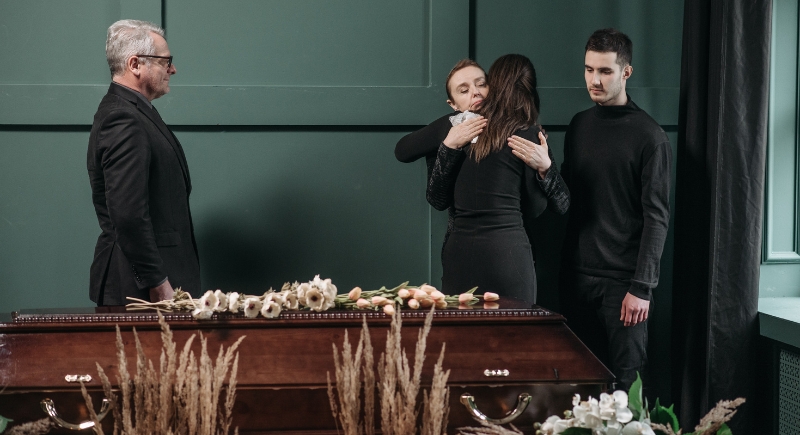After a loved one passes, grief barges in and turns the lights off. One day, you're making coffee; the next, you're staring into the mug, wondering how life continued after the tragedy. People expect you to follow a tidy roadmap of healing, but what unfolds is wild, unpredictable, and deeply personal. Nothing prepares you, and somehow, that's the part people forget to say out loud.
The Physical Toll of Grief

Credit: freepik
You might feel drained, sore, nauseated, or off-balance. That's your body reacting to a surge of stress hormones, disrupting sleep and digestion. Some people experience chest pressure or headaches that feel like warning signs of illness. There's even a condition called broken heart syndrome, which mirrors a heart attack.
There's No "Getting Over It" Quickly

Credit: freepik
No set timeline can box in what loss feels like. One person might feel steady after a few months, another might still feel raw years later. That five-stage theory—denial, anger, bargaining, depression, acceptance—offers structure, but emotions rarely arrive so neatly. There's no single route, and that's perfectly okay.
Your World Stops, but the World Keeps Turning

Credit: freepik
The strangest part of loss is how everything else keeps going. Your heart's in pieces, but your inbox is full, the barista still asks your name, and people online are debating lattes. That disconnect can feel surreal, even maddening. Therapists call it dissociation—a mental fog where the world feels far away.
Navigating Triggering Dates

Credit: Getty Images
Certain days carry more weight than others after a loss. A birthday, an anniversary, or even a holiday can bring a sharp sense of absence. Starting a new habit, like cooking their favorite meal or sharing a memory, can help make the day feel less hollow. Changing how you spend those moments lets you hold on in a different way.
The Sting of Well-Meaning Words

Credit: Getty Images
Kind words don't always feel kind in the thick of grief. Lines like "It was meant to be" or "At least they're no longer suffering" can sting more than soothe. They try to wrap loss neatly, but grief doesn't follow a script. A simple "This is awful, and I'm here" lands better than a polished phrase.
Shifting Friendships in Grief

Credit: Getty Images
Some friends show up with meals and quiet company, while others drift off, unsure how to respond. That shift can sting, especially when it's someone you thought would stick around. Support also comes from new places—people who understand without needing an explanation. Letting go of who steps back makes room for those who stay, listen, and help.
The Overwhelming Practicalities Smother You

Credit: pexels
Losing a loved one can pile up a flood of tasks. You're making calls, filing forms, and chasing paperwork before you've had time to sit still. Executors face even more—handling money, sorting taxes, and following legal steps while carrying fresh grief. Then you face the rooms. Deciding what stays or goes takes energy you may not have.
A Trigger Might Take You Back

Credit: Canva
A song plays, a scent drifts by, and suddenly you're somewhere else entirely—back with someone you miss. They can sting or soothe, sometimes both at once. Giving those memories space instead of pushing them away can bring clarity. Some days, that flash of remembrance feels like a quiet visit from someone you miss.
The Weight of Simple Tasks

Credit: Canva
Even the basics—brushing your teeth, getting dressed, and making toast—can feel too heavy to handle after loss. Grief takes a toll on your body and mind, draining energy and disrupting sleep, appetite, and focus. Starting small helps. Gentle habits, like writing down thoughts or sitting in sunlight, can slowly build rhythm in the middle of the mess.
Maintaining Connection Beyond Physical Presence

Credit: freepik
Some connections don't end with a funeral. You might hear their voice in your head, talk to them while folding laundry, or dream about them in ways that feel real. This is known as continuing bonds—a natural part of grief. Holding onto objects, repeating routines, or marking dates can help keep that link steady.
Finding Moments of Laughter

Credit: iStockphoto
You might laugh at a memory or crack a joke during a quiet moment, and it can feel strange. That laughter might catch you off guard, maybe even leave you wondering if it's wrong. It's not. Finding light in the dark honors the loss.
Strength in Seeking Support

Credit: Getty Images
Talking to a counselor allows you to name what's hard and learn how to handle it. Support groups bring you into a room where others get it. You listen, you share, you nod. It doesn't fix what's gone, but helps you move through the days with less confusion.
Burden of Unwanted Advice

Credit: freepik
Unwanted advice has a way of showing up loudest in quiet moments. "Stay strong" or "move on" might be meant to help, but they often do the opposite. Disenfranchised grief —mourning that gets dismissed or ignored—can make everything heavier. You don't owe anyone a timeline or a tidy version of your pain.





